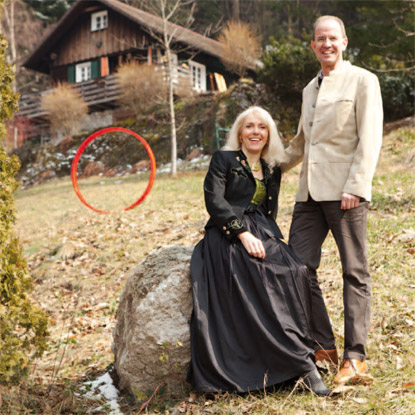Ein Sonntagsdienst in einem Krankenhaus in Süddeutschland. In einem ruhigen Moment an diesem azurblauen Tag trinken die beiden Assistenzärzte einen Kaffee zusammen. Ob er Lust habe, mit ihr in die Oper Otello zu gehen, schlägt Michaela Bellm ihrem Kollegen vor. Ihre Leidenschaft galt dem Musiktheater. Im Parsifal waren ihr einmal mit den ersten Klängen des Vorspiels, immer sind es diese ersten Klänge, die Tränen über die Wangen gelaufen. Wie es geschieht, wenn man nahe am Leben ist und es nicht weiss. Bald, sehr bald saßen die beiden nebeneinander in einer Aufführung des Rings. Und wussten, etwas Entscheidendes hatte begonnen. Rüdiger Feik entdeckte seine Musikalität. Er las viel von und über den Komponisten, blieb abwartend. Schließlich Tristan und Isolde im Festspielhaus. Seitdem sind die Tage in der Bayreuther Sommergesellschaft ihre Auszeit. Gemeinsam erleben die beiden die Modernität der Mythen und die Musik, die sie erfüllt, verstört und bereichert. Sie diskutieren die Raffinesse Wagnerscher Bühneneffekte, die Leitmotiv-Technik, die so viel coole Soundtracks geboren hat, all die Ambivalenzen und ob man die Person Wagner und das Werk voneinander trennen kann oder nicht. Der Gesellschaft der Freunde sind die beiden beigetreten, um das Konzept von Bayreuth zu unterstützen: Es ist ja nicht so, dass sie von jeder Inszenierung beseelt sind, wer ist das schon. Aber dass „eine konservative Seele wie Wolfgang Wagner“ dem seltenen Vogel Christoph Schlingensief den Parsifal anvertraute, diese Spannung zwischen Konvention und Avantgarde, zwischen Werktreue und Regietheater möchten sie erhalten. Dies alles verbindet uns, sagen beide. Und fragen sich ab und zu fröhlich, wie alles gekommen wäre, wenn Rüdiger Feik an einem Sommertag vor zwanzig Jahren das Casting nicht bestanden hätte.
Pursuit with Wagner On a Sunday afternoon of weekend duty in a hospital in southern Germany, an azure blue sky above them, and a cup of coffee in their hand, physician assistant Michaela Bellm asks her physician assistant colleague if he might want to go see Otello with her. She was an enthusiastic lover of opera already, traveling all over Germany to catch interesting productions. Then one day, in Parsifal, tears started rolling down her cheeks during the Prelude – right on those opening notes. Perhaps premonitions of things to be …? Soon, very soon, the two were sitting together in a production of the Ring. Both knew that this was the beginning of something special. Rüdiger Feik discovered his own musicality, much to his own surprise. He read a lot about and of Wagner – and bid his time. Finally they experienced Tristan und Isolde in the Festspielhaus. From that moment on, they have made the Green Hill their annual summering grounds. Together they experienced the modernity of the myths, the music which fulfills, disturbs, and enriches them. They discuss the ingenuity of Wagner’s stage effects, the Leitmotivs that have inspired so many movie soundtracks, all the ambivalence, and whether Wagner the person and Wagner the work can really be separated or not. The both joined the Society of Friends because they want to support the idea of Bayreuth. It’s not like they love every production – who does. But that a conservative soul like Wolfgang Wagner could entrust a strange bird like Christoph Schlingensief with a work like Parsifal, that is the kind of tension between convention and avantgarde, between textual fidelity and Regietheater, they want to help preserve. It connects us, they both say. Every once in a while they ask each other jokingly, how things might have turned out, if Rüdiger Feik hadn’t, that Summer-Sunday twenty years ago, heeded the call of the opera.
Dimanche de garde dans un hôpital du sud de l’Allemagne. Lors d’un moment de calme de ce jour brillant d’azur, les deux médecins assistants partagent un café. Michaela Bellm demande à son collègue s’il n’aurait pas envie d’aller voir Otello à l’opéra. A l’époque, sa passion embrassait tout le lyrique, elle partait aux quatre coins de l’Allemagne pour voir une mise en scène. Dans Parsifal, une fois, les premiers accords du prélude lui avaient arraché des larmes… Ces premiers accords, toujours… et comme à l’improviste, lorsque l’on est pris dans le flux de la vie, vite, très vite, tous deux se retrouvaient dans une représentation de la Tétralogie. Et ils savaient que quelque chose de décisif venait de commencer. A sa grande surprise, Rüdiger Feik découvrait, sa propre musicalité. Il se documenta sur les compositeurs, dans l’expectative. Et enfin, ce fut Tristan et Isolde au Festspielhaus. Depuis, les journées en compagnie des estivants de Bayreuth forment une pause incontournable. Ils vivent ensemble la modernité de ces mythes et de cette musique qui les comble, les bouscule et les enrichit à la fois. Ils échangent des discussions sur le raffinement des effets scéniques de Wagner, de cette technique du leitmotiv qui a donné lieu à tant de bande originales de films, sur toutes ces ambivalences et sur la grande question de savoir s’il est possible de séparer Wagner, en tant que personne, de son œuvre. Ils ont adhéré tous deux à la Société des amis de Bayreuth afin d’apporter leur soutien à l’idée de Bayreuth : ce n’est pas qu’il soient fanatique de chacune des mises en scène — qui le serait ? Mais le fait qu’une « âme conservatrice comme Wolfgang Wagner » ait pu confier Parsifal à ce drôle d’oiseau de Christoph Schlingensief, cette alliance du conventionnel et de l’avant-garde, de fidélité aux œuvres et de « regietheater », ça, ils souhaitent que ça reste. C’est ce qui nous unit, affirment-ils. Et ils se demandent de temps en temps, amusés, ce qui se serait passé si Rüdiger Feik n’avait pas passé ce casting avec succès, par un jour d’été, il y a vingt ans.

